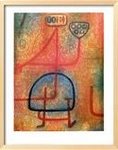After so many posts related in some way to my own self-fashioning (via blogs, nametags, Facebook, etc.), it was liberating to bang out a fairly straightforward and relatively inconsequential post on sports.
That said, I admit to burying the day’s highly consequential lede. The Beckham signing was announced the day Congress took aim at the U.S. President’s “surges,” also known, though little recognized, as the 21,000 flesh and blood men and women who will put their lives on the line for a war unsupported by two-thirds of the citizens who front the monies that fund those soldiers’ salaries as well as said unsupported and tragically mismanaged war. Whew. Also the same day I taught “new world narratives” by Walter Raleigh (about Guiana), Francis Drake (Nova Albion, or San Francisco), and Thomas Hariot (Virginia).
Welcome, then, to this term’s edition of “What century is it?”
Last term’s game was played the week I was teaching Thomas More’s Utopia (1516) and Bob Woodward’s State of Denial (2006) came out. As I noted then, Woodward’s portrayal of Bush among the flatterers echoed Raphael Hythloday’s observation that sixteenth-century foreign policy gets perverted by courtier self-interest.
This week, Raleigh’s tract administered the most potent dose of das Heimliche. When I prepared my students for the reading, I called attention to the two contradictory gestures framing the title: “The Discovery of the large, rich, and beautiful Empire of Guiana, with a relation of the great and golden city of Manoa (which the Spaniards call El Dorado).”
“Discovery” suggests dibs -- that is, that Raleigh and his fellow journeymen “discovered” the region in such a way they can lay claim to it. Of course, we all know Europeans didn’t unearth territory that had already been there, indeed inhabited and civilized. But what’s amusing about Raleigh’s title is that it initially purports to report the discovery of Guiana, only to acknowledge, eventually and parenthetically, that the Spanish got there first – and already named the place. The subsequent tract will call on Queen Elizabeth I to send “surges” of British troops to reclaim – and one would imagine, rename -- the territory for England.
Raleigh does not begin the treatise so transparently, however [btw, I’m working with the excerpt in the Norton Sixteenth and Seventeenth Century Volume, eighth edition]. Rather, the tract begins rather innocuously as a personal eyewitness account of the region. Raleigh waxes poetic that “we beheld that wonderful breach of waters which ran down Caroni; and might from that mountain see the river how it ran in three parts, about twenty miles off, and there appeared some ten or twelve overfalls in sight. . ." Sounds luverly, dunnit?
Only further in does Raleigh's survey of the landscape begin to take on a whiff of recon. Amid references to "hills so raised here and there over the valleys, the plains adjoining without bush or stubble, all fair green grass," Raleigh notes "the ground of hard sand easy to march on either for horse or foot." What begins as pastoral reverie becomes increasingly military in outlook.
Indeed: sand . . . uranium, WMDs. Far from a comprehensive and objective assessment of the region, the evidence is hand-picked to support Raleigh's proposed mission for England to colonize Guiana. Writing “I never saw more beautiful country nor more lively prospects,” Raleigh's choice of prospects is significant, for it reads doubly, to refer both to peaks in the landscape, and to prospects for England, were British troops to set foot there.
Raleigh proposes the Guiana mission in particular because he claims the gold found there will fund the operation. He launches a new paragraph, “I will promise these things that follow, which I know to be true,” and proceeds to report that “The common soldier shall here fight for gold, and pay himself, instead of pence, with plates of half a foot broad, whereas he breaketh his bones in other wars for provant and penury. Those commanders and chieftains that shoot at honor and abundance shall find there more rich and beautiful cities, more temples adorned with golden images, more sepulchers filled with treasure, than either Cortez found in Mexico, or Pizarro in Peru.”
Gold, oil. You do the math.
The narrative progressively surges to where Raleigh assures the Queen that, “if there were but a small army afoot in Guiana, marching towards Manoa the chief city of Inca, he would yield to her Majesty by composition [or by voluntary contract; my italics] so many hundred thousand pounds yearly, as should both defend all armies abroad and defray all expenses at home.”
Small army. “Greeted as liberators.” Pay for itself. ‘Nuff said.
While most of these narratives were written in the sixteenth century, I chose to use these texts to launch the second, seventeenth-century-based term of my year-long survey of Renaissance Prose and Poetry, not only to work the “new term,” “new world” angle, but also to flag nuances in the term “empire,” a word central to Raleigh’s title and mission, and etymologically and conceptually related to empiricism, a concept our class will discover in seventeenth-century prose authors such as Francis Bacon.
When Bacon proposes new territories (e.g., the “New Atlantis”) for learning, he works the “new learning,” “new world” angles himself. The so-called “father of modern science,” Bacon is concerned to “discover” and rename modes of knowledge previously claimed, indeed cornered, by the humanists viz. classical rhetoric. Bacon writes: "men began to hunt more after words than matter; more after the choiceness of the phrase, and the round and clean composition of the sentence, and the sweet falling of the clauses, and the varying and illustration of their works with tropes and figures, than after the weight of matter, worth of subject, soundness of argument, life of invention or depth of judgment." Substituting "things" for "words," Bacon demands that learned men redirect their attention from the study of language and devote their study to "things" and "matter."
As I asked my students in my first-day-of-term overview, what role will language nonetheless play in advancing this new brand of “learning”? After all, The Advancement of Learning (1605), the treatise Bacon writes to introduce this new mode of knowledge, is written to King James I, specifically to implore the king to direct his “magnanimitie,” aka reach for his cheque-book, to fund Bacon's new mission (the groundwork, in fact, for the Royal Societies).
But as we see in Raleigh’s treatise, as well as the obfuscations of the neo-cons, facts aren’t facts, strictly defined, when summoned in the service of a fundamentally rhetorical exercise. Traced to the Latin imperium, and thus to imperre, or to command, both empire and empiricism presuppose the use of language to survey the available data -- and then summon the troops.
In this light, there is something more to take from the report of Sir Walter Raleigh, “stupid get.” For, far from proposing neo-con notions that the arrival of the British military will result in a healthy restructuring of the region (a "domino effect"), Raleigh is eventually quite blunt (after his cagily worded title) that the purpose of the mission is to fortify British rule: “For whatsoever prince shall possess [Guiana] shall be greatest, and if the king of Spain enjoy it, he will become irresistible. Her Majesty hereby shall confirm and strengthen the opinions of all nations as touching her great and princely actions.”
“The opinions of all nations” confirmed, that the U.S. cannot be trusted to act in the world's interests, can someone please tell the President to lay down his Camus and pick up a couple of these Renaissance strangers?
Words and things. Liberal education indeed.
Post Post-script, Jan. 15: Two things. First, I haven't blocked out those long quotes (MLA style) because I'm having an issue with block quotes in Blogger (the subsequent text gets misformatted for no reason). More important, I suppose I should note that I did not teach these texts through the lens of the Iraq war, but through the lens I described when referring here to my teaching. I teach modes of analysis (how to think -- the *many ways -- versus what to think), and my primary allegiance is to the (course) material. I clarify that because, after all, I was the one who made a big stink about how blogging represents our work. In that respect, I concede that the blog -- and here I actually mean *this blog, versus blogging in general -- remains extra-curricular, in that it offers the opportunity to settle any unfinished business I may have with a text, business that's relevant, and hopefully compelling, to a general readership. It's all a work in progress, when you think about it.



No comments:
Post a Comment